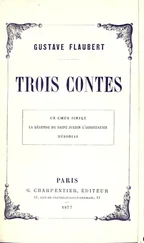The following day, she presented herself early at the church so as to receive communion from the cure. She took it with the proper feeling, but did not experience the same delight as on the previous day.
Madame Aubain wished to make an accomplished girl of her daughter; and as Guyot could not teach English or music, she decided to send her to the Ursulines at Honfleur.
The child made no objection, but Felicite sighed and thought Madame was heartless. Then, she thought that perhaps her mistress was right, as these things were beyond her sphere. Finally, one day, an old fiacre stopped in front of the door and a nun stepped out. Felicite put Virginia's luggage on top of the carriage, gave the coachman some instructions, and smuggled six jars of jam, a dozen pears and a bunch of violets under the seat.
At the last minute, Virginia had a fit of sobbing; she embraced her mother again and again, while the latter kissed her on the forehead, and said: "Now, be brave, be brave!" The step was pulled up and the fiacre rumbled off.
Then Madame Aubain had a fainting spell, and that evening all her friends, including the two Lormeaus, Madame Lechaptois, the ladies Rochefeuille, Messieurs de Houppeville and Bourais, called on her and tendered their sympathy.
At first the separation proved very painful to her. But her daughter wrote her three times a week and the other days she, herself, wrote to Virginia. Then she walked in the garden, read a little, and in this way managed to fill out the emptiness of the hours.
Each morning, out of habit, Felicite entered Virginia's room and gazed at the walls. She missed combing her hair, lacing her shoes, tucking her in her bed, and the bright face and little hand when they used to go out for a walk. In order to occupy herself she tried to make lace. But her clumsy fingers broke the threads; she had no heart for anything, lost her sleep and "wasted away," as she put it.
In order to have some distraction, she asked leave to receive the visits of her nephew Victor.
He would come on Sunday, after church, with ruddy cheeks and bared chest, bringing with him the scent of the country. She would set the table and they would sit down opposite each other, and eat their dinner; she ate as little as possible, herself, to avoid any extra expense, but would stuff him so with food that he would finally go to sleep. At the first stroke of vespers, she would wake him up, brush his trousers, tie his cravat and walk to church with him, leaning on his arm with maternal pride.
His parents always told him to get something out of her, either a package of brown sugar, or soap, or brandy, and sometimes even money. He brought her his clothes to mend, and she accepted the task gladly, because it meant another visit from him.
In August, his father took him on a coasting–vessel.
It was vacation time and the arrival of the children consoled Felicite. But Paul was capricious, and Virginia was growing too old to be thee–and–thou'd, a fact which seemed to produce a sort of embarrassment in their relations.
Victor went successively to Morlaix, to Dunkirk, and to Brighton; whenever he returned from a trip he would bring her a present. The first time it was a box of shells; the second, a coffee–cup; the third, a big doll of ginger–bread. He was growing handsome, had a good figure, a tiny moustache, kind eyes, and a little leather cap that sat jauntily on the back of his head. He amused his aunt by telling her stories mingled with nautical expressions.
One Monday, the 14th of July, 1819 (she never forgot the date), Victor announced that he had been engaged on a merchant–vessel and that in two days he would take the steamer at Honfleur and join his sailer, which was going to start from Havre very soon. Perhaps he might be away two years.
The prospect of his departure filled Felicite with despair, and in order to bid him farewell, on Wednesday night, after Madame's dinner, she put on her pattens and trudged the four miles that separated Pont–l'Eveque from Honfleur.
When she reached the Calvary, instead of turning to the right, she turned to the left and lost herself in coal–yards; she had to retrace her steps; some people she spoke to advised her to hasten. She walked helplessly around the harbour filled with vessels, and knocked against hawsers. Presently the ground sloped abruptly, lights flitted to and fro, and she thought all at once that she had gone mad when she saw some horses in the sky.
Others, on the edge of the dock, neighed at the sight of the ocean. A derrick pulled them up in the air, and dumped them into a boat, where passengers were bustling about among barrels of cider, baskets of cheese and bags of meal; chickens cackled, the captain swore and a cabin–boy rested on the railing, apparently indifferent to his surroundings. Felicite, who did not recognise him, kept shouting: "Victor!" He suddenly raised his eyes, but while she was preparing to rush up to him, they withdrew the gangplank.
The packet, towed by singing women, glided out of the harbour. Her hull squeaked and the heavy waves beat up against her sides. The sail had turned and nobody was visible;—and on the ocean, silvered by the light of the moon, the vessel formed a black spot that grew dimmer and dimmer, and finally disappeared.
When Felicite passed the Calvary again, she felt as if she must entrust that which was dearest to her to the Lord; and for a long while she prayed, with uplifted eyes and a face wet with tears. The city was sleeping; some customs officials were taking the air; and the water kept pouring through the holes of the dam with a deafening roar. The town clock struck two.
The parlour of the convent would not open until morning, and surely a delay would annoy Madame, so, in spite of her desire to see the other child, she went home. The maids of the inn were just arising when she reached Pont–l'Eveque.
So the poor boy would be on the ocean for months! His previous trips had not alarmed her. One can come back from England and Brittany; but America, the colonies, the islands, were all lost in an uncertain region at the very end of the world.
From that time on, Felicite thought solely of her nephew. On warm days she feared he would suffer from thirst, and when it stormed, she was afraid he would be struck by lightning. When she harkened to the wind that rattled in the chimney and dislodged the tiles on the roof, she imagined that he was being buffeted by the same storm, perched on top of a shattered mast, with his whole body bend backward and covered with sea–foam; or,—these were recollections of the engraved geography—he was being devoured by savages, or captured in a forest by apes, or dying on some lonely coast. She never mentioned her anxieties, however.
Madame Aubain worried about her daughter.
The sisters thought that Virginia was affectionate but delicate. The slightest emotion enervated her. She had to give up her piano lessons. Her mother insisted upon regular letters from the convent. One morning, when the postman failed to come, she grew impatient and began to pace to and fro, from her chair to the window. It was really extraordinary! No news since four days!
In order to console her mistress by her own example, Felicite said:
"Why, Madame, I haven't had any news since six months!—"
"From whom?—"
The servant replied gently:
"Why—from my nephew."
"Oh, yes, your nephew!" And shrugging her shoulders, Madame Aubain continued to pace the floor as if to say: "I did not think of it.—Besides, I do not care, a cabin–boy, a pauper!—but my daughter—what a difference! just think of it!—"
Felicite, although she had been reared roughly, was very indignant. Then she forgot about it.
It appeared quite natural to her that one should lose one's head about Virginia.
Читать дальше








![Гюстав Флобер - Закат Карфагена [Сборник]](/books/414440/gyustav-flober-zakat-karfagena-sbornik-thumb.webp)

